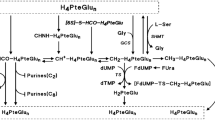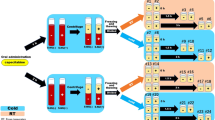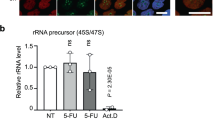Abstract
The effect of delayed uridine administration on the in vitro growth inhibitory effects of 5-fluorouracil (5FU) and on the in vivo antitumour activity and toxicity was studied. In vitro growth inhibition of the human intestinal cell lines WiDr and Intestine 407 by 3 microM 5FU could be reversed by 1.0 mM uridine; the effect was more pronounced with WiDr cells. At 0.1 mM uridine an intermediate effect was observed. Inhibition of colony formation in both cell lines could also be reversed by delayed administration of uridine at 0.1 and 1 mM. Incorporation of 5FU into RNA of WiDr cells did not proceed after addition of uridine, in contrast to Intestine 407 cells. In these cells only a partial inhibition was observed. In vivo we studied the effect of uridine on two colon carcinoma tumour lines, the 5FU sensitive Colon 38 and the relatively resistant Colon 26. 5FU was administered i.p. in a weekly schedule. With Colon 26 delayed administration of uridine (3500 mg kg-1) at 2 and 20 h after 5FU enabled us to increase the 5FU dose from 100 to 250 300mg kg-1. The combination of high-dose 5FU and uridine resulted both in a superior antitumour effect and an increase in life span. In the 5FU sensitive Colon 38 we determined whether the sensitivity to 5FU was affected by uridine. Mice were treated at the non-lethal dose of 100 mg kg-1 which inhibited tumour growth almost completely. Delayed administration of uridine did not significantly affect the antitumour effect. In non-tumour bearing mice we studied the time course of the reversal of the haematological toxicity of 5FU. The effective dose of 100 mg kg-1 induced a significant decrease in leukocytes; in combination with delayed uridine the leukopenia was less severe and recovered more rapidly. 5FU also induced a decrease in haematocrit, which could be prevented by delayed administration of uridine. In conclusion, in cell culture the reversal of 5FU cytotoxicity could be achieved at a low concentration of 0.1 mM uridine, the extent of the reversal might be related to the 5FU incorporation into RNA. In vivo the relatively resistant tumour Colon 26 could be treated with a higher dose of 5FU in the presence of uridine. The sensitivity to 5FU of the sensitive Colon 38 was not affected by delayed administration of uridine, while the haematological toxicity of 5FU was less. So, delayed administration of uridine after 5FU resulted in an improved therapeutic effect in both a relatively resistant and sensitive tumour.
This is a preview of subscription content, access via your institution
Access options
Subscribe to this journal
Receive 24 print issues and online access
$259.00 per year
only $10.79 per issue
Buy this article
- Purchase on Springer Link
- Instant access to full article PDF
Prices may be subject to local taxes which are calculated during checkout
Similar content being viewed by others
Author information
Authors and Affiliations
Rights and permissions
About this article
Cite this article
Peters, G., van Dijk, J., Laurensse, E. et al. In vitro biochemical and in vivo biological studies of the uridine 'rescue' of 5-fluorouracil. Br J Cancer 57, 259–265 (1988). https://doi.org/10.1038/bjc.1988.56
Issue Date:
DOI: https://doi.org/10.1038/bjc.1988.56
This article is cited by
-
Potent combination therapy for human breast tumors with high doses of 5-fluorouracil: remission and lack of host toxicity
Cancer Chemotherapy and Pharmacology (2012)
-
5-Fluorouracil dose escalation enabled with PN401 (triacetyluridine): toxicity reduction and increased antitumor activity in mice
Cancer Chemotherapy and Pharmacology (2006)
-
Modulation of 5-fluorouracil host-toxicity and chemotherapeutic efficacy against human colon tumors by 5-(Phenylthio)acyclouridine, a uridine phosphorylase inhibitor
Cancer Chemotherapy and Pharmacology (2006)
-
5-(Phenylthio)acyclouridine: a powerful enhancer of oral uridine bioavailability: relevance to chemotherapy with 5-fluorouracil and other uridine rescue regimens
Cancer Chemotherapy and Pharmacology (2005)
-
Effects of 5-benzylacyclouridine, an inhibitor of uridine phosphorylase, on the pharmacokinetics of uridine in rhesus monkeys: implications for chemotherapy
Cancer Chemotherapy and Pharmacology (1995)



